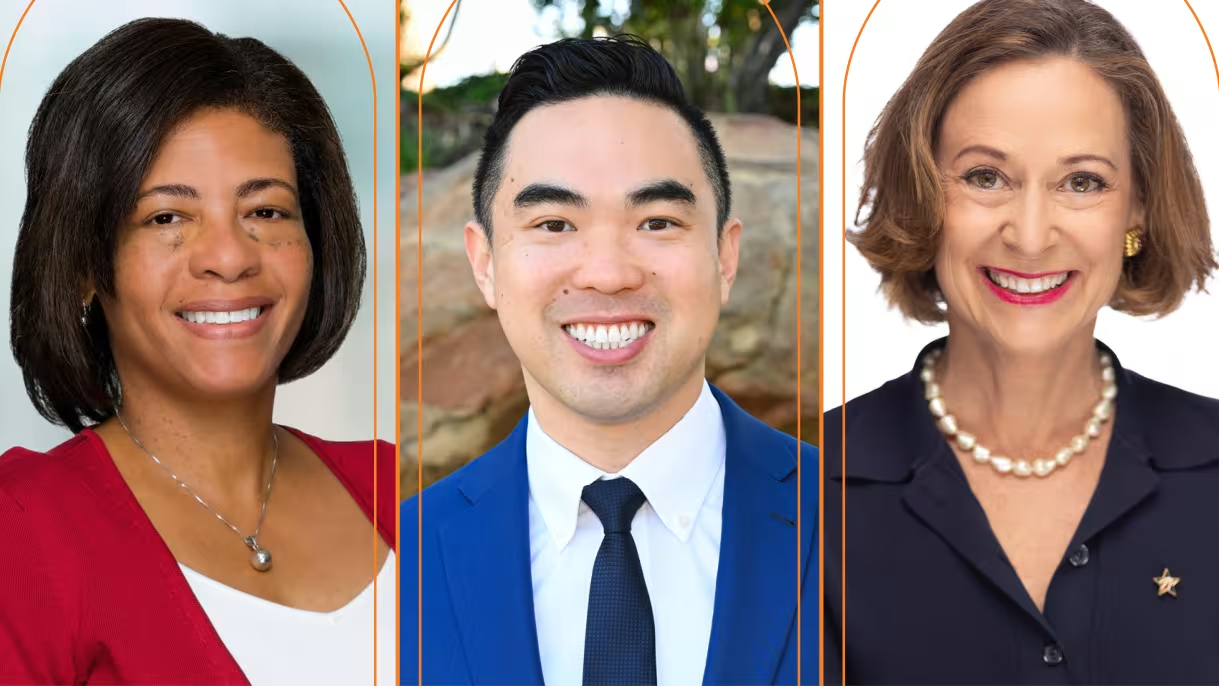

Industry Insiders: Princeton SPIA Alumni in Philanthropy
For more than 90 years, alumni from the Princeton School of Public and International Affairs have had meaningful careers in a multitude of industries, perhaps none more so than the federal government. But as government cuts reduce opportunities for a new group of civil servants, Princeton SPIA alumni have stepped up to offer everything from advice to job references for their fellow Tigers.
Three alumni with prominent careers in philanthropy — Kathy Roth-Douquet MPA ’91, CEO, Blue Star Families; Michelle Feist MPA ’97, senior program officer, Gates Foundation; and Seyron Foo MPA ’14, chief engagement and intergovernmental relations officer, Los Angeles Affordable Housing Solutions Agency — came together to share why they chose to work for foundations, how the lessons learned in a SPIA classroom translated to the real world, and offer guidance to future graduates seeking similar careers.
Princeton SPIA: Broadly, what interested you in working for a foundation? Was there a moment when you could see yourself pursuing a career in this field?

Kathy Roth-Douquet: At SPIA, I was struck by the question “How can we as a society organize ourselves better so that people in our society can lead the best lives possible?” It strikes me that there are many approaches to that problem: politics and government, policy and academia, for-profit, nonprofit, and, of course, philanthropy. Philanthropy, by having dollars untethered from strict ROI and risk/reward calculations, is better able to test ideas and achieve good results.

Seyron Foo: Philanthropy helps test-and-learn what government and the market are unable to do. It offers the resources to support creativity, relationships, and innovation in service to the communities we serve. At its best, philanthropy offers flexible dollars to supplement public resources, which are often constrained.

Michelle Feist: Before joining philanthropy, I spent over two decades working for a nonprofit organization that partnered with K–12 schools/districts. That experience helped me understand what it takes to improve educational systems and student outcomes. Moving into philanthropy felt like a natural next step for me since it gave me an opportunity to apply what I’d learned with greater impact and scale. Working at a foundation has allowed me to develop and fund programs that are innovative, responsive to the needs of communities, and that elevate the voices of students and teachers. I get to support a portfolio of amazing organizations that are developing fresh approaches to longstanding challenges. The work has been very rewarding.
PS: How did Princeton SPIA prepare you, or alter your preparations, for this field after graduation?
KRD: Princeton SPIA provided excellent preparation for a career in philanthropy. It’s rigorous — that’s the most important part. It stresses systems thinking and skepticism, which is important because there are few, if any, checks and balances to philanthropy. It also exposes you to a broad range of thinking, and philanthropy is best when it is cross-disciplinary.
MF: Across my classes at SPIA, I learned how to frame problems, ask the right questions, quickly synthesize information, and make informed decisions. I also learned to absorb new information and content quickly in a way that was rigorous and data-informed. These skills have been as important in my career as field-level expertise. On a more practical level, SPIA helped me find the internship that led to my 20-year career before entering philanthropy. When I switched my career focus, I was able to tap into the SPIA network for guidance in navigating this new field. When I got to the final interview for my current position, I was happy to see that the person interviewing me was also a SPIA graduate.
SF: Just by highlighting careers in philanthropy, SPIA has played an instrumental role for me. I remember coming to Princeton’s Junior Summer Institute (JSI) Program as a rising senior at UC Berkeley, and in addition to the rigor of the summer preparation, JSI brought back SPIA alums to talk about their careers. One of them was a person who talked about her time at the Rockefeller Foundation. It was because of SPIA alum Trina Gonzalez MPP ’13 that I made my foray into philanthropy. I was two years shy of starting my career in local government when Trina reached out about a job at SoCal Grantmakers. That really started my 10-year hiatus from government service. Of course, SPIA provided the skillset training, but it was ultimately learning from SPIA alums about their careers that helped me prepare for this field.
PS: Princeton SPIA’s graduates want to better their communities. What are some ways that a career in philanthropy allows them to do so?
MF: Philanthropy gives you a powerful platform to make changes by directly funding community organizations and partnering with local governments. Working in this field also allows you to fund innovative solutions to community challenges that are most meaningful to you. In a lot of cases, foundations can focus on longer-term investments and fund more creative solutions than governments. On a personal level, many foundations, including mine, invest heavily in programs that support employee volunteerism and giving. These dollars provide additional resources to the local communities where we live and the specific organizations we care about.
KRD: I highly recommend a stint in philanthropy for those interested in public good, and entry early can be a strategic choice because it’s otherwise a difficult field to break into. Philanthropy allows for experimentation, and that is extremely important for discovering promising policies or changes. You can discover and uplift nonprofits or political leaders with local initiatives that can have real impact. Also, the relationships and exposure you get from philanthropy can help your future aspirations. I was better able to launch my nonprofit later in life because of my experience in philanthropy. It helped me understand how foundations think and invest and gave me relationships that were instrumental in my success.
SF: Philanthropy should be about moving resources to communities — quickly and flexibly. And we know that’s not always the case, depending on the type of philanthropy. But when grounded deeply in people and the community, philanthropy can be a partner to help a community achieve its aspirations. But we should be honest – philanthropy can also thwart these aspirations. It’s the responsibility of each of us who enter these positions of power in philanthropy to keep the north star of resource mobilization.
PS: What have been some of your big “wins” in your current role?
MF: The work that my team funds is focused on improving math outcomes for students of color and students from low-income backgrounds. We will be investing over $1 billion as we focus on making math more relevant, engaging, and motivating. The work is ambitious, exciting, and personal. As someone who never considered myself a “math” person or found much joy in the subject, I love seeing students of color finding joy and empowerment in their math experience.
KRD: We’ve worked with some fantastic philanthropies in my organization, Blue Star Families, which have made a tremendous impact in our growth, direction, and community work. Plus, we have become a philanthropy ourselves, regranting to help shape other organizations that serve our community. We recently completed a three-year longitudinal study funded by USAA, where we identified four key factors for resilience in military families. As a result, all of our programming is clustered around ideas that improve those factors. During our “Welcome Week” programming, where we help host events for the 600,000 military families who relocate every year and are at risk of becoming isolated, our programming has shown an increase in personal and family wellbeing, and increased sense of belonging.
SF: Working in grantmaking, I always say I’m a resource mobilizer, and I’m not an implementer. What I will say, however, is that I’ve been fortunate and privileged to work with extraordinary people who are creating durable and sustainable change for many different communities.
PS: What advice do you have for Princeton SPIA students who might be interested in pursuing a career with a foundation?
MF: There are many pathways into philanthropy — some people enter early, while others, like me, come after years of direct field experience. No matter the route, it is really important to stay grounded in the realities and needs of the communities you support. Even though you will bring a lot of expertise to your job, your role is not the “expert” but a supporter and enabler. Doing the job well requires humility and curiosity. Philanthropy is a diverse field, so it is important to do your homework when looking at positions. While you may find jobs related to your field and interests, each funder has a different approach to grantmaking and impact. Take time to explore organizations that align with your own interests and values. Philanthropy is an amazing field where you get to give money away and support work that you care about. It is an incredible opportunity. However, it is up to you to be a good steward of these dollars and invest in the most impactful work. This requires you to be nimble, disciplined, rigorous, collaborative, curious, and strategic — skills that SPIA helps you develop.
KRD: I recommend people seek to break in young, immediately out of SPIA when it might be more accessible, and then to not only stay in philanthropy, but move in and out. There is a great moral hazard in philanthropy. You have money, and other people want it. People will not be honest with you; they will flatter you, and it can be hard to have a true perspective because it is hard not to be susceptible to the deference with which people treat those in philanthropy.
SF: On the other hand, I would say to think twice about jumping into a foundation from the onset. It’s tempting, but I think there’s something about building deep relationships with a community before taking on a grantmaking role. I think understanding the philanthropic challenges as the recipient of these dollars has made me a more effective grantmaking partner and keeps me humble. The power differential is real, and being able to remain grounded in humility, in the values of service, is essential for a career in philanthropy.

